
SKASE Journal of Theoretical Linguistics
Scope & Guideline
Pioneering New Perspectives in Theoretical Linguistics
Introduction
Aims and Scopes
- Cross-Linguistic Analysis:
The journal emphasizes comparative studies across languages, examining syntactic, morphological, and semantic structures to uncover universal linguistic principles and language-specific features. - Cognitive Linguistics:
Research often incorporates cognitive perspectives, exploring how language reflects and shapes human thought, with a focus on metaphor, semantics, and the interaction between language and cognition. - Morphological and Syntactic Structures:
A significant area of focus is on the intricacies of morphological and syntactic phenomena, including derivation, conversion, and the grammatical frameworks that govern these processes. - Pragmatics and Discourse Analysis:
The journal also addresses pragmatic aspects of language, investigating how context influences meaning and the social functions of language in communication. - Language Documentation and Description:
The journal contributes to the documentation of lesser-studied languages and dialects, providing insights into their unique linguistic features and enriching the field of theoretical linguistics.
Trending and Emerging
- Onomatopoeia and Sound Symbolism:
Emerging interest in the study of onomatopoeias and sound symbolism across languages indicates a growing recognition of the relationship between sound and meaning, and how these elements contribute to linguistic creativity. - Cognitive and Semantic Approaches to Language:
The journal has increasingly featured research that applies cognitive semantic frameworks to various linguistic phenomena, illustrating the relevance of cognitive processes in understanding language structure and use. - Interdisciplinary Methodologies:
There is a notable trend towards employing interdisciplinary methodologies that combine linguistic analysis with insights from fields such as anthropology, psychology, and ecology, reflecting a holistic approach to language study. - Sociolinguistic Perspectives:
An uptick in sociolinguistic research exploring language use in social contexts, including the impact of cultural factors on language, suggests a growing interest in how language functions within communities. - Language Variation and Change:
Research focusing on language variation and change, particularly in the context of globalization and cultural exchange, is becoming increasingly prominent, reflecting the dynamic nature of language in contemporary society.
Declining or Waning
- Traditional Syntax Theory:
There has been a noticeable decline in papers centered solely on traditional syntactic theories, such as strict generative grammar frameworks, as the focus shifts towards more integrative and cross-disciplinary approaches. - Descriptive Linguistics of Well-Studied Languages:
Research focusing on the descriptive aspects of widely studied languages (e.g., English, French) appears less frequently, suggesting a potential waning interest in these languages in favor of exploring underrepresented languages. - Static Semantic Analysis:
The journal has seen fewer contributions dedicated to static semantic theories, as emerging research emphasizes dynamic and context-sensitive approaches to semantics.
Similar Journals
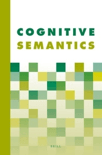
Cognitive Semantics
Diving Deep into the Semantics of ThoughtCognitive Semantics, published by BRILL, is a leading academic journal dedicated to the intricate study of cognitive processes underlying language use and semantic meaning. With its ISSN 2352-6408 and E-ISSN 2352-6416, this journal contributes significantly to the fields of linguistics and language studies, reflecting its importance in contemporary research on cognitive linguistics. Over its publication span from 2015 to 2024, it has established a niche as a Q3 ranked journal in the Linguistics and Language category for 2023, showcasing its relevance and growing influence in the academic community. Although currently not open access, the journal aims to provide a robust platform for exchanging ideas, theories, and methodologies related to cognitive semantics, fostering interdisciplinary dialogue among researchers, professionals, and students. Readers can expect to uncover valuable insights into the cognitive mechanisms that shape our understanding of language, making this journal an essential resource for anyone involved in linguistic research.
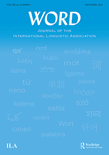
WORD-JOURNAL OF THE INTERNATIONAL LINGUISTIC ASSOCIATION
Navigating the evolving landscape of language research.WORD-JOURNAL OF THE INTERNATIONAL LINGUISTIC ASSOCIATION is a leading peer-reviewed journal dedicated to advancing the field of linguistics and language studies. Published by Routledge Journals, Taylor & Francis Ltd, this esteemed journal has earned a reputation for its rigorous scholarship, reflected in its 2023 Q2 ranking in Linguistics and Language and its solid performance in Scopus Ranks. Encompassing a wide range of topics—from theoretical frameworks to empirical research—WORD serves as an essential resource for linguistics researchers, educators, and students alike. While currently not operating under an open access model, the journal is committed to providing high-quality, impactful research articles that contribute significantly to the linguistic community. With its convergence periods from 1998 to 2009 and 2015 to 2024, WORD continuously fosters the discourse of language studies, ensuring that critical insights and discussions are accessible for ongoing academic exploration.
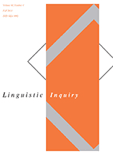
LINGUISTIC INQUIRY
Fostering Critical Dialogue in LinguisticsLINGUISTIC INQUIRY is a premier journal published by MIT PRESS, representing a critical platform for the advancement of research in the fields of linguistics and language studies. With an impressive Q1 category ranking in both linguistics and language disciplines for 2023, and ranking #149 in Arts and Humanities and #174 in Social Sciences according to Scopus metrics, this journal stands at the forefront of academic conversations around language theory, analysis, and application. LINGUISTIC INQUIRY caters to a diverse audience of researchers, professionals, and students, providing a robust forum for original research articles and theoretical discussions that push the boundaries of our understanding of language. While the journal currently does not offer open access, it remains an essential resource for those engaged in cutting-edge linguistic research. The journal's continuous publication since 1996 demonstrates its long-standing commitment to linguistic scholarship and innovation.

Language and Linguistics
Fostering Interdisciplinary Approaches to LinguisticsLanguage and Linguistics is a leading academic journal published by ACAD SINICA, INST LINGUISTICS, based in Taiwan. Established in 2008, this journal has rapidly gained recognition within the field of linguistics, achieving a commendable ranking of Q2 in the 2023 category quartiles and holding positions in the top percentiles of Scopus rankings for both Arts and Humanities and Social Sciences. With an ISSN of 1606-822X and an E-ISSN of 2309-5067, the journal aims to foster the development of linguistics research by providing a platform for the dissemination of innovative and interdisciplinary studies. While it currently operates on a traditional subscription model, its significant contribution to the advancement of linguistic theory and its applications makes it an invaluable resource for researchers, professionals, and students alike. Spanning converged years from 2008 to 2024, Language and Linguistics continues to shape the dialogue in understanding language phenomena and encourages submissions that push the boundaries of current linguistic knowledge.

Glossa-A Journal of General Linguistics
Elevating Linguistic Research for a Global AudienceGlossa: A Journal of General Linguistics, published by the Open Library of Humanities, stands as a leading voice in the realm of linguistic research since its inception in 2016. With its Q1 category ranking in Linguistics and Language and impressive Scopus ranks encompassing the top 83rd and 81st percentiles in its respective fields, Glossa fosters a vibrant academic community committed to the rigorous exploration of language and linguistic theory. Operating under an open access model, the journal not only enhances the visibility of groundbreaking research but also ensures that valuable insights are accessible to a global audience. The journal's commitment to interdisciplinary dialogue makes it an indispensable resource for scholars, professionals, and students eager to engage with contemporary developments in linguistics. As it converges into 2024, Glossa continues to champion innovative scholarship and critical discourse that challenges conventional boundaries within the field.
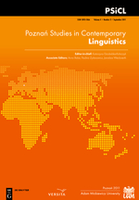
Poznan Studies in Contemporary Linguistics
Exploring the forefront of linguistic innovation.Poznan Studies in Contemporary Linguistics, published by DE GRUYTER MOUTON, is a pivotal journal in the field of linguistics, with an ISSN of 0137-2459 and an E-ISSN of 1897-7499. Located in Germany, this esteemed journal has consistently contributed to the academic landscape since its inception. As of 2023, it holds a Q2 category rank in Linguistics and Language and boasts commendable Scopus rankings, featuring in the 69th percentile for Arts and Humanities and the 66th percentile for Social Sciences. The journal emerges as a vital platform for scholars to explore contemporary linguistic theories and practices, making it an essential resource for researchers, professionals, and students alike. With a converged publication period from 2007 to 2024, it aims to facilitate a deeper understanding of linguistic advancements and trends. While the journal currently does not offer open access, its rigorous peer-review process ensures the highest quality of published research, strengthening its role as a leading discourse in the dynamic field of linguistics.

Studi e Saggi Linguistici
Connecting Scholars in the Evolving World of LinguisticsStudi e Saggi Linguistici is a distinguished academic journal published by EDIZIONI ETS, based in Pisa, Italy. With its ISSN 0085-6827, this journal has established itself as a vital resource in the field of linguistics, particularly noted for its contributions since its inception in 2016. Although currently categorized in the lower quartile (Q4) by the 2023 metrics in the domains of Linguistics and Language within Scopus, it remains a significant platform for innovative research and critical discussions surrounding language studies. Focusing on both theoretical and practical aspects of linguistics, the journal serves as a nexus for scholars and practitioners alike, facilitating a rich interchange of ideas and knowledge in a rapidly evolving discipline. As an invaluable publication for researchers, professionals, and students, Studi e Saggi Linguistici is committed to advancing the understanding of linguistic phenomena and fostering scholarly communication in its field.
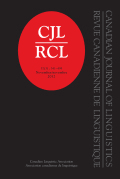
CANADIAN JOURNAL OF LINGUISTICS-REVUE CANADIENNE DE LINGUISTIQUE
Illuminating the diverse landscape of language studies.The Canadian Journal of Linguistics - Revue canadienne de linguistique is a prestigious peer-reviewed publication dedicated to advancing the field of linguistics. Published by Cambridge University Press, this journal has firmly established itself as a vital resource for researchers, professionals, and students alike, offering insights into a diverse range of linguistic studies and theories. With an impressive impact factor reflecting its academic rigor, the journal is ranked Q2 in the categorization of linguistics and language as of 2023, and holds commendable positions in both Scopus ranks for Arts and Humanities as well as Social Sciences. The journal's converged years span from 1996 to 2024, showcasing a rich history of contributions to the discipline. Although it currently does not offer open access, it remains highly influential. Located in Canada, the journal plays a crucial role in fostering scholarly communication within the linguistic community, making it an essential outlet for disseminating groundbreaking research and engaging discussions.
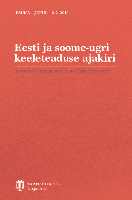
Eesti ja Soome-Ugri Keeleteaduse Ajakiri-Journal of Estonian and Finno-Ugric Linguistics
Fostering Insights into Estonian and Finno-Ugric HeritageEesti ja Soome-Ugri Keeleteaduse Ajakiri - Journal of Estonian and Finno-Ugric Linguistics is a premier academic journal published by UNIV TARTU PRESS, dedicated to advancing the field of linguistics with a particular focus on the Estonian and Finno-Ugric languages. Since its inception, the journal has embraced an Open Access publishing model, allowing researchers and enthusiasts to freely explore its groundbreaking studies and findings since 2013. With an Impact Factor that places it in the Q3 quartile of leading journals within the linguistic domain, it serves as a vital platform for the dissemination of new research and theoretical advancements. Ranked 410th out of 1088 journals in the Arts and Humanities category for Language and Linguistics, it reflects a robust commitment to quality scholarship that appeals to academics, professionals, and students alike. Operating from Tartu, Estonia, the journal aims to foster greater understanding and appreciation of the Estonian language within the broader context of Finno-Ugric studies, making it an essential resource for anyone interested in these unique linguistic cultures.

Russian Journal of Linguistics
Bridging Cultures Through the Science of LanguageWelcome to the Russian Journal of Linguistics, a prestigious journal published by Peoples Friendship University of Russia that has made significant strides in the realm of linguistic studies since its inception. With an Open Access policy established in 2019, this journal provides unparalleled opportunities for researchers, professionals, and students to share and disseminate groundbreaking linguistic research. The journal is currently ranked in the Q1 category for Linguistics and Language and boasts impressive Scopus rankings, placing 129th out of 1088 in the Arts and Humanities, and 148th out of 1167 in the Social Sciences. Focusing on a diverse range of linguistics topics, the journal aims to facilitate cross-disciplinary dialogue and foster advancements in the study of language. Located in Moscow, Russia, it champions the vibrant linguistic community by consistently publishing high-quality research that contributes to the global understanding of language dynamics. We invite you to explore the wealth of knowledge and insight the Russian Journal of Linguistics has to offer.